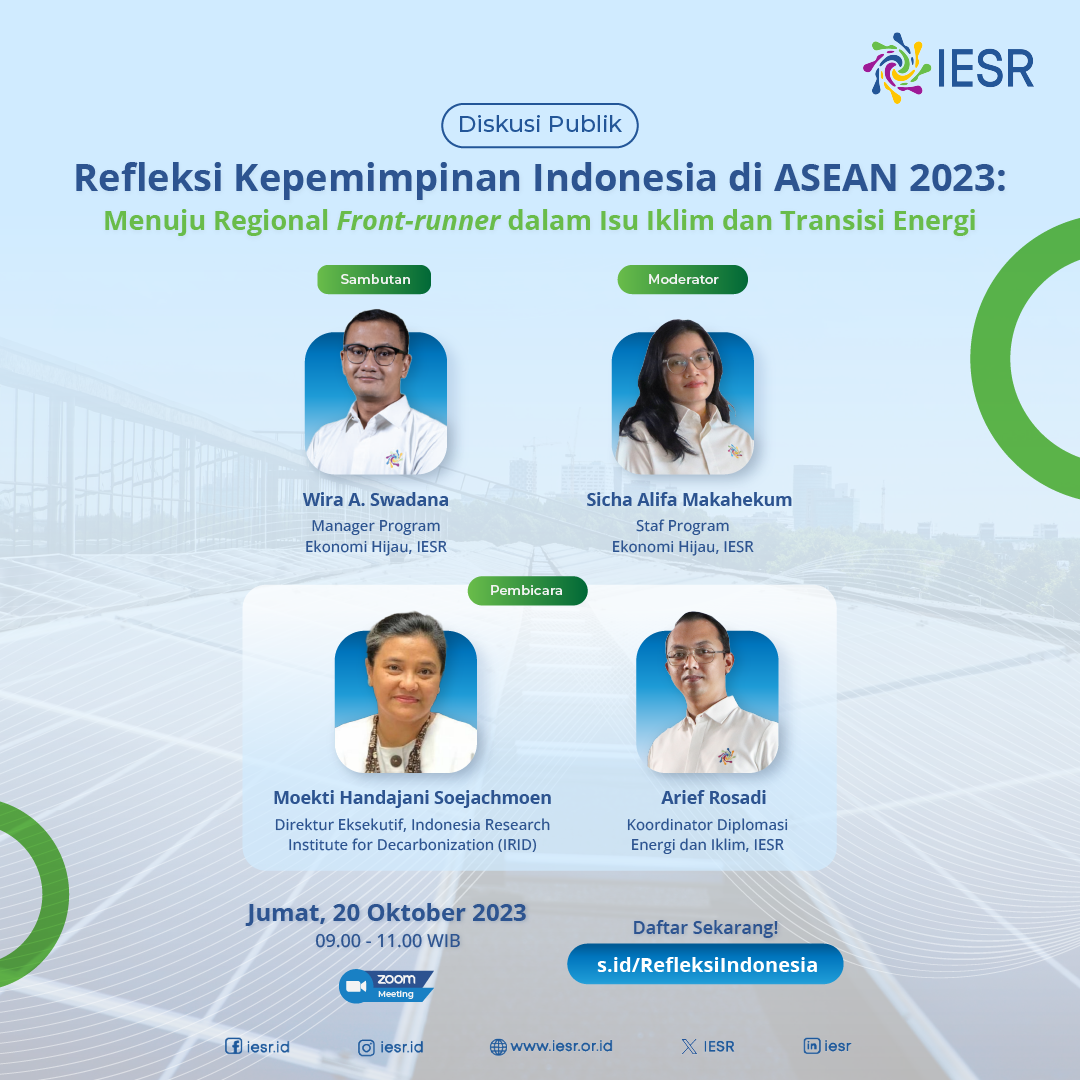
Public Discussion on Reflection on Indonesia’s Leadership in ASEAN 2023: Towards Regional Frontrunner on Climate Issues and Energy Transition
Replay Event
Background
ASEAN is currently experiencing a rapid pace of economic growth, with its GDP predicted to grow by around 4.6% by 2023 (Shofa, 2023a) and become the world’s fifth largest economy by 2030 (Shofa, 2023b). This forecast was also adopted in the ASEAN leaders’ statement that ASEAN will become the center of world economic growth during the ASEAN Summit in September. The statement also emphasized the importance of developing a green economy at the regional level to achieve net zero emissions, although ASEAN also faces the challenge that its energy system is still dominated by fossil energy. According to the World Economic Forum (2023), fossil energy accounts for 83% of ASEAN’s overall energy mix, making it the region’s largest source of emissions. At the same time, ASEAN can no longer rely on fossil energy to support its economy and needs to urgently transition to renewable energy, to achieve the target of 23% renewable energy mix by 2025 (ASEAN, 2023). To achieve this target, ASEAN as a region needs to strengthen its regional energy policy as well as domestic policy implementation in each of its member states (AMS).
Under Indonesia’s leadership in ASEAN 2023, Indonesia also adopted some of last year’s G20 priority issues, such as digital transformation, sustainable energy, and global economic recovery. Furthermore, Indonesia also emphasized the theme of sustainable energy security through interconnection by calling for increased interconnection with the implementation of the ASEAN Power Grid (APG) as well as the Trans-ASEAN Gas Pipeline (TAGP) (JMS, 2023). This gesture indicates that Indonesia’s leadership in ASEAN 2023 is more focused on ambitions to improve regional infrastructure development, rather than to achieve collective goals such as increasing climate targets and also renewable energy in the ASEAN energy mix, as stated in the ASEAN Joint Statement on Climate Change to the UNFCC for COP28 (ASEAN, 2023). The ASEAN Leaders Declaration (2023) outlines how ASEAN will achieve its targets and also recognizes several agendas, including the development of a regional ecosystem for electric vehicles, climate change, energy security, equitable transition, and other development issues within an inclusive economic framework, to ensure the achievement of sustainable economic growth in ASEAN. The document also incorporates climate change as one of the economic issues, as described in the ASEAN Strategy for Carbon Neutrality (ASEAN, 2023). Despite having outputs that address the green economy (1. Green industry; 2. Interoperability within ASEAN; 3. Credible global standards; and 4. Green capabilities), ASEAN still warmly welcomes the use of CCS/CCUS technologies that have yet to prove their impact for emission reduction. ASEAN’s preference to use CCS/CCUS technology may become an obstacle to achieving climate and energy transition targets in the region.
In the domestic context, Indonesia is still not utilizing its renewable energy potential to meet the targets set in the Paris Agreement. According to the Climate Action Tracker analysis (2022), Indonesia is rated as ‘Very Inadequate’ in its climate ambition. One of the reasons is inconsistency in the energy sector, where the percentage of coal mix increases from 62% in 2025 to 64% in 2030 referring to the 2021-2023 RUPTL. In addition, the Government of Indonesia is also developing a regulatory framework related to CCUS in order to make Indonesia a CCS Hub in the Southeast Asia region. On the other hand, Indonesia has yet to develop a more comprehensive carbon pricing strategy. This could pose a challenge to the development of lower-carbon renewable energy and decarbonization efforts in Indonesia and the region. Indonesia, as the largest economy and one of the most influential countries in the region, needs to demonstrate a more strategic position to drive the climate ambitions of other ASEAN member states through concrete examples that will be reflected in energy and climate diplomacy, especially after its power in ASEAN in 2023.
In this regard, the Institute for Essential Services Reform (IESR) will organize a public discussion to discuss Indonesia’s energy and climate diplomacy position in ASEAN. The discussion will reflect on Indonesia’s position and build inputs for the development of energy and climate diplomacy strategy post its ASEAN power in 2023.
Objective
- To provide a discussion platform for the public and relevant stakeholders to enhance the role of Indonesia’s climate and energy diplomacy in ASEAN, specifically related to carbon financing and energy and climate diplomacy strategies.
- To obtain feedback and inputs for the preparation of Indonesia’s climate and energy diplomacy plan that can be followed up by relevant stakeholders at both national and regional levels.
Presentation
Future of Clean Energy in ASEAN – Arief Rosadi
Masa-Depan-Energi-Bersih-di-ASEAN-Arief-Rosadi-Carbon Pricing ASEAN – Kuki Soejachmoen
Carbon-Pricing-ASEAN-Kuki-Soejachmoen
